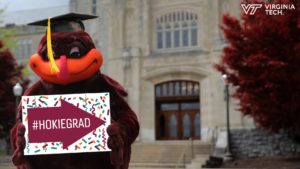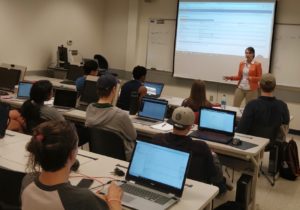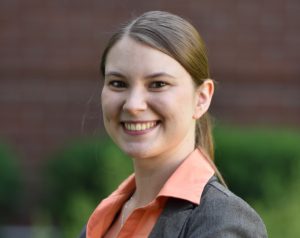 Among Virginia Tech graduates celebrating their achievements today include four Ph.D. and five master’s students at the Discovery Analytics Center.
Among Virginia Tech graduates celebrating their achievements today include four Ph.D. and five master’s students at the Discovery Analytics Center.
Four Ph.D. students and one master’s student plan to complete degrees during the summer.
“The thoughtful and impactful research our students have engaged in while pursuing their graduate degrees has been recognized by many major academic conferences and is testament to their hard work,” said Naren Ramakrishnan, the Thomas L. Phillips Professor of Engineering and director of the center.
“We are always very proud of our graduates but especially so this year as they have had to persevere through some very unusual circumstances to achieve their goals,” Ramakrishnan said. “We wish them continued success as they venture into new career challenges at universities, research laboratories, and businesses.”
Ph.D. Spring graduates
Bijaya Adhikari, advised by B. Aditya Prakash, is receiving a Ph.D. in computer science. His research interests are data science and machine learning for large networks and data driven epidemiology. The title of his dissertation is “Domain-based Frameworks and Embeddings for Dynamics over Networks.” Adhikari is joining the Department of Computer Science at the University of Iowa in the fall as a tenure track assistant professor.
Tyler Chang, advised by Layne Watson, is receiving a Ph.D. in computer science. His research interests are numerical approximation, optimization, algorithms, parallel computing, data science, and scientific computing. The title of his dissertation is “Mathematical Software for Multi-objective Optimization Problems.” Chang is joining the Mathematics and Computer Science Division at Argonne National Laboratory in Chicago, Illinois. Specifically, he will work in the Laboratory for Applied Mathematics, Numerical Software, and Statistics as a postdoctoral appointee, a group he previously interned with.
Michelle Dowling, advised by Chris North and Mike Horning, is receiving a Ph.D. in computer science. She is also receiving a graduate certificate in urban computing, a National Science Foundation-sponsored program administered through DAC. Dowling’s research interests are human-computer interaction, data analytics, information visualization, and interactive data visualization. The title of her dissertation is “Semantic Interaction for Symmetrical Analysis and Automated Foraging of Documents and Terms.” Dowling is joining Grand Valley State University, her alma mater, as an assistant professor.
Mohammad Raihanul Islam, advised by Naren Ramakrishnan, is receiving a Ph.D. in computer science. His research interests are social network/media analysis, deep learning, and graph neural network. The title of his dissertation is “Detecting and Mitigating Rumors in Social Media.” Islam is joining Amazon, Inc., as an applied scientist.
Liuqing Li, advised by Edward Fox, is receiving a Ph.D. in computer science. His research interests are digital library, social analysis, machine learning, and deep learning. The title of his dissertation is “Event-related Collections Understanding and Services.” Li is joining Yahoo! as a research scientist.
Master’s Spring Graduates
Arjun Choudhry, advised by Naren Ramakrishnan, is receiving a master’s degree in computer science. His research interests are narrative generation, blockchain technologies. His thesis is titled “The Art of Simplifying Graph Interpretation: Narrative Generation Using Causal Exploration of Directed Graphs.” Choudhry is joining Amazon, Seattle, as a software development engineer.
Jeffrey McCullen, advised by Chandan Reddy, received a master’s degree in computer science. His research interests are machine learning and data analytics in healthcare, and software engineering. The title of his thesis is “Predicting the Effects of Sedative Infusion on Acute Traumatic Brain Injury Patients.”
Joseph Messou, advised by Jia-Bin Huang, is receiving a master’s degree in computer engineering. His research interests are computer vision and machine learning, efficient training methods for networks, and cybersecurity. The title of his thesis is “Handling Invalid Pixels in Convolutional Neural Networks.” In the fall, Messou will be a Ph.D. student in computer engineering at the University of Maryland, College Park.
Shih-Yang Su, advised by Jia-Bin Huang, is receiving a master’s degree in computer engineering. His research interests are machine perception, visual representation learning, and reinforcement learning. His thesis is titled “Learning to Handle Occlusion for Motion Analysis and View Synthesis.” In the fall, Su will be a Ph.D. student in computer science at the University of British Columbia, where his research will focus on learning and understanding human motion for motion synthesis and character animations.
Ming Wang, advised by Chris North, is receiving a master’s degree in computer science. Her research interests are visual analytics and information visualization. Her thesis is titled “Bridging Cognitive Gaps Between User and Model in Interactive Dimension Reduction.” Wang is joining Salesforce as a software engineer.
Summer Ph.D. graduates
Zhiqian (Danny) Chen, advised by Chang-Tien Lu, will complete his Ph.D. in computer science. Chen’s research interests are graph mining, urban computing, network science. The title of his dissertation is “Graph Neural Networks: Techniques and Applications.” Chen will join the Computer Science and Engineering Department at Mississippi State University as assistant professor.
Tianyi Li, advised by Chris North, will complete her Ph.D. in computer science. Her research interests include developing systems for computer-supported cooperative work and devising visual analytics tools with user-centered design to combine and coordinate human and artificial intelligence in broader, real-world sensemaking processes. Her dissertation is titled “Solving Mysteries with Crowds: Supporting Crowdsourced Sensemaking with a Modularized Pipeline and Context Slices.” Li will be joining Loyola University in Chicago as assistant professor.
Thomas Lux, advised by Layne Watson, will complete his Ph.D. in computer science. His research interests are approximation, optimization, and mathematical software. His dissertation is titled “Interpolants and Error Bounds for Modeling and Predicting Variability in Computer Systems.”
Moeti Masiane, advised by Chris North, will complete his Ph.D. in computer science. He has received a graduate certificate in urban computing, a National Science Foundation-sponsored program administered through DAC. Masiane’s research interests include information visualization, data modeling, insight, sampling, and perception modeling. The title of his dissertation is “Insight Driven Sampling for Interactive Data Intensive Computing.”
Summer master’s graduate
Milad Afzalan, advised by Hoda Eldardiry, will complete his master’s degree in computer science. His research interests include machine learning, pattern recognition, smart grid, and energy efficiency. The title of his thesis is “Household electricity load shape segmentation from smart meter data based on temporal patterns and power magnitude.” Afzalan, who will also be receiving a Ph.D. from Virginia Tech in civil engineering, will join ENGIE as a data scientist.

 Among Virginia Tech graduates celebrating their achievements today include four Ph.D. and five master’s students at the
Among Virginia Tech graduates celebrating their achievements today include four Ph.D. and five master’s students at the 

